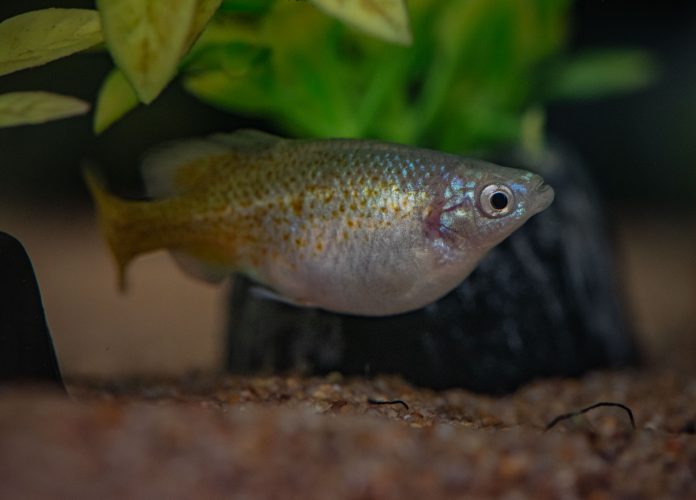Hollywood megastar Leonardo DiCaprio has hailed the work of Chester Zoo for “bringing a rare fish species back from the dead.”
Experts from the zoo, alongside our amazing conservation partners, have just helped to resurrect the golden skiffia fish from extinction during this year’s Day of the Dead celebrations in Mexico. The team released more than 1,000 fish back to the Teuchitlan River – a place where the species hadn’t been seen since the 1990’s!
The group of golden skiffia had been successfully bred by aquarists who created a conservation breeding programme that prevented the fish from becoming globally extinct.

With one in three freshwater fish threatened with extinction, they are the most threatened group of vertebrates on the planet.
The reintroduction of the fish coincided with the country’s Day of the Dead celebrations – where families honour their departed ancestors and welcome them back from the dead.
Omar Domínguez-Domínguez, a professor and researcher from the Michoacan University of Mexico, who is leading the golden skiffia reintroduction, said:
“The Day of the Dead is a traditional Mexican celebration, when it is believed that people’s deceased ancestors return to the land of the living for one night, to talk and spend time with their families. Releasing the golden skiffia at this time is a metaphor for how the species has come back from the dead to return to its home, not for one night, but forever.
“Releasing this species back into the wild is a light of hope for this wonderful family of fishes – the goodeids – and for the conservation of freshwater fish more generally. Knowing that universities, zoos and aquarists can come together to fix some of what has been destroyed and return to nature some of what has been lost is an amazing thing.”
Human disturbance caused by dam construction, water extraction, pollution and the introduction of invasive species have caused major changes to the skiffia’s habitat – pushing it to extinction in its only known home. But in 2014, scientists from the Michoacan University of Mexico and passionate fishkeepers from the Goodeid Working Group helped restore the degraded habitat and remove non-native species from the Teuchitlán ecosystem.

Conservationists hope that the fish being released will ultimately result in a healthy, self-sustaining population that can fulfil its important natural role in the ecosystem of eating algae and mosquito larvae, which helps keep populations of those species in check.
Paul Bamford, Regional Programme Manager for Latin America at Chester Zoo, added:
“This project is a great example of how zoos can contribute to conservation in the field through conservation breeding and research, utilising the skills and experience that have been developed in zoos to help strengthen existing and new wild populations. By supporting freshwater conservation in Mexico and the ecosystems where the fish live, we’re not only protecting biodiversity and the wellbeing of freshwater environments, but also the people and communities that live alongside them.”
The golden skiffia release comes just a few years after the successful reintroduction of the tequila splitfin, which faced very similar threats to the golden skiffia and was also prevented from extinction as a result of a conservation action by experts from Chester Zoo and its partners. Following a successful reintroduction into the Teuchitlán River, the population of tequila splitfin is now thriving and the project has been cited as an International Union for the Conservation of Nature case study for successful global reintroductions.
This project is part of Fish Ark Mexico, a conservation project in central Mexico that focuses on 41 highly threatened species of freshwater fish. Fish Ark Mexico has more than 20 years of experience in Mexican fish conservation and has succeeded in keeping 39 species of endangered and extinct-in-the-wild goodeid species in zoos and aquariums. The Fish Ark facility at the Michoacan University of Mexico in Morelia has been supported by several national and international conservation organisations, including Chester Zoo, Re:wild and SHOAL.
Harmony Patricio, SHOAL conservation programme manager and Re:wild’s freshwater fish conservation programme manager, said:
“With thousands of freshwater species threatened with extinction, the story of the golden skiffia returning to the wild is inspiring evidence of the many opportunities for conservation impact that together can reverse the freshwater biodiversity crisis. The SHOAL partnership is expanding freshwater species conservation awareness, funding, capacity and action to meet the level of the challenge, and positive stories such as the golden skiffia reintroduction can help draw attention to the challenges facing freshwater ecosystems, which have historically been overlooked and underfunded.”
In preparation for the species return to the wild, the fish were first placed in ponds, so they could begin to adapt to different conditions. The fish were then taken to floating pods in the river known as mesocosms where they live for at least a month, so that they can further adapt to natural conditions before release. Individuals released into the wild were tagged and will be monitored for the next five years to assess whether the population is increasing and whether the fish are reproducing and growing successfully in the river.
Conservation reintroductions such as the release of golden skiffia back into the wild will be vital to ensuring extinctions are halted and populations are given the best possible chances of bouncing back from the brink.
Bringing the species back from the ‘dead’ is the result of collaborative efforts between experts from Chester Zoo, Michoacan University of Mexico, Goodeid Working Group, Re:wild and SHOAL who are developing a plan to save Mexican goodeid species – one of the world’s most threatened group of fish – which includes the golden skiffia and tequila splitfin.







